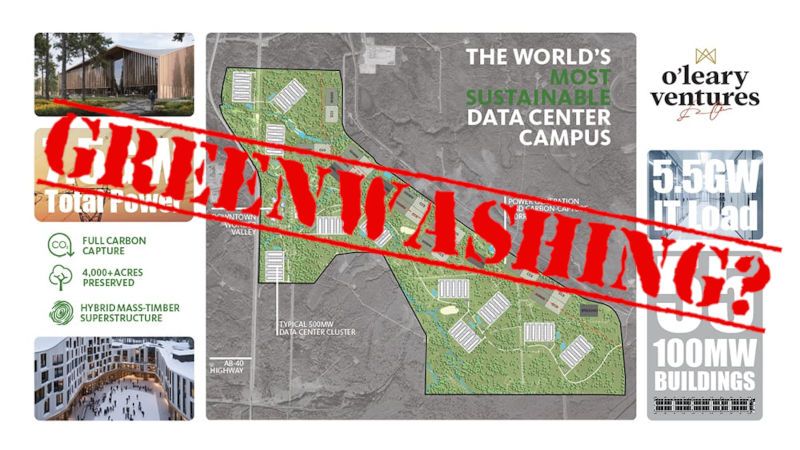Is this greenwashing? Asking for our friend Kevin O'Leary

The Wonder Valley website is making emissions-related claims that O'Leary Ventures' CEO has openly admitted are false. Are they running afoul of Canada's greenwashing legislation?
Recently, we wrote about how Paul Palandjian, CEO of O'Leary Ventures, admitted in April that carbon capture is too expensive for hyperscalers, telling conference attendees, "all of these green aspirational stories are great, but it's not happening yet, and we're all trying to figure out how to lower that carbon footprint and do it cleanly".
And yet, an infographic [archive] uploaded in June to Wonder Valley's website claims that the project will be "the world's most sustainable data center campus" and implies a zero-emissions system with "full carbon capture".
Are they kidding?
Canada's anti-greenwashing rules
One might wonder if O'Leary Ventures' legal theam has anyone keeping tabs on Canadian legislation - specifically the amendments made in 2024 to the Competition Act that added langage targeting greenwashing.
If not, they might want to start, because the financial penalties for engaging in deceptive marketing practices can be pretty hefty by most people's standards: up to $10 million for a first offense ($15 million for subsequent violations), 3x the benefit derived by the company due to the deception, or 3% of the company's total annual revenues, whichever amount is greater.
The rules themselves are designed to be applied quite broadly - not just to the marketing of consumer products, but also to environment-related claims about business activities in general. And it's working. Oil & gas sector companies have suddenly become a lot more careful with their marketing material: in one case, as the rules were about to take effect, the Pathways Alliance decided to take down their website entirely [archive] rather than risk prosecution.
Incidentally, when Mark Cameron, Pathways Alliance spokesperson and former top advisor to Stephen Harper, appeared in front of the Senate Committee on Banking, Commerce, and the Economy in May 2024 to oppose the amendments, he was asked a number of questions about carbon capture and storage. One startling admission he made was that the cost of carbon capture is "probably in the $200 to $250-a-ton range". For comparison, Canada's future price on emissions in 2030 will only be $170 per ton!
The Pathways Alliance were right to be worried, because the Competition Bureau doesn't mess around. In 2022, two years before the greenwashing amendments were passed, Keurig Canada paid settlements totalling nearly $4 million for claiming their coffee pods are recyclable, despite only a few recycling programs outside of BC and Quebec accepting them. (Also, there are apparently a lot of steps that need to be taken in order for a coffee pod to actually get recycled.) In other words, Keurig's claim may have been technically true - or true in theory - but it was false in practice.
Palandjian's comment in April about "green aspirational stories" shows that, like the Competition Bureau, he recognizes there's frequently a gap between marketing narratives and objective reality. In Keurig's case, this gap cost them $4 million - not exactly chump change. By the way, this was the penalty with Keurig Canada voluntarily cooperating with regulators.
Is Kevin O'Leary hoping for a fight with the feds?
So, given the no-nonsense enforcement approach of the Competition Bureau, it's a little odd that O'Leary Ventures is so brazen about its environmental claims. It almost makes you wonder if, just maybe, they're hoping for a fight?
We've already seen that Premiers Danielle Smith and Scott Moe are extremely keen to have a brawl over federal environmental regulations: they recently made a joint statement containing a slew of demands, which include repealing the Impact Assessment Act, removing the ban on oil tankers on the northern west coast, and other minor tweaks like "repealing any federal law or regulation that purports to regulate industrial carbon emissions, plastics, or the commercial free speech of energy companies".
(For anyone not familiar: that last phrase - "commercial free speech" - is a euphemism for making false and/or misleading environmental claims. It means, in other words, lying to the public. Greenwashing.)
As for Kevin O'Leary, it wouldn't be surprising if he's hoping to use all this as a marketing opportunity. Inserting himself into the fight would be a great excuse for him to get back in his comfort zone, and do another US media tour - where he can once again spew BS about Canadian regulations with zero pushback, while simultaneously promoting his US business interests. For someone like O'Leary, who's frantically pitching projects with price tags in the billions, $10 million might sound like the cost of doing business.
Fighting greenwashing
Ultimately though, the issue isn't whether or not O'Leary is aware of Canadian regulations, or whether or not he wants to create a media spectacle for his own benefit. The real issue is that there are unambiguous environmental claims being made on the Wonder Valley website that are directly contradicted by the words of his company's CEO.
Maybe someone oughta ask the Competition Bureau if they plan to do something about that?
